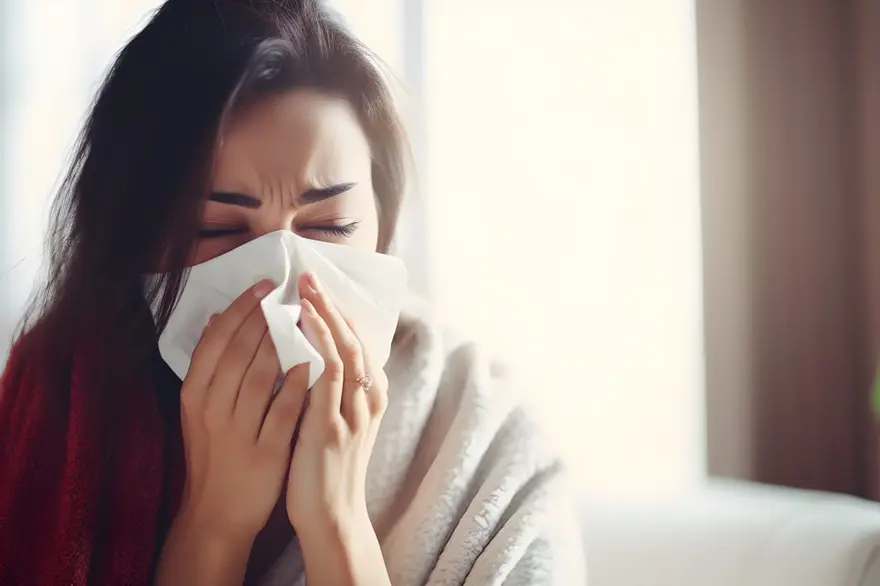Preventive Healthcare
Winter Lung Health: How Dry, Cold Air Impacts Your Airways
573 Views
0

As the temperature drops and winter sets in, the dry, frigid air can take a toll on your respiratory system. Winter lung health is a critical concern for many people, especially those with pre-existing conditions like asthma or COPD. Understanding how cold weather affects your airways is crucial for maintaining optimal lung health in winter. In this article, we'll explore the impact of winter on your lungs, common respiratory issues, and provide practical winter lung health tips to help you breathe easier during the colder months.
Understanding the Impact of Winter on Your Airways
The cold, dry air of winter can have several adverse effects on your respiratory system. When you breathe in this air, it can dry out the mucous membranes in your nose and throat, reducing their ability to filter out irritants, dust, and germs. This makes you more susceptible to winter respiratory infections like colds, flu, and sinusitis.
Additionally, cold air can cause the airways to narrow and become irritated, leading to coughing, wheezing, and shortness of breath. This is particularly problematic for people with asthma or COPD, as their airways are already sensitive and inflamed.
Common Winter Lung Issues
Several respiratory problems are more prevalent during the winter months. Here are some of the most common ones:
- Asthma: Cold air is a known trigger for asthma flare-ups. The dry, frigid air can irritate the airways, causing them to swell and produce excess mucus. This can lead to coughing, wheezing, chest tightness, and difficulty breathing.
- Bronchitis: Both acute and chronic bronchitis can worsen in winter. The cold air can irritate the bronchial tubes, causing inflammation and increased mucus production. Symptoms may include a persistent cough, chest congestion, and shortness of breath.
- Pneumonia: While pneumonia is caused by a viral or bacterial infection, cold weather can exacerbate symptoms. Breathing in cold air can irritate the lungs, leading to inflammation and fluid buildup. Signs of pneumonia include fever, chills, cough with mucus, and difficulty breathing.
- COPD: People with Chronic Obstructive Pulmonary Disease (COPD) are particularly vulnerable in winter. The cold air can cause the airways to constrict, making it harder to breathe. COPD flare-ups are more common during this season, leading to increased coughing, wheezing, and shortness of breath.
Tips to Protect Your Lungs in Winter
Fortunately, there are several steps you can take to safeguard your lungs and promote optimal winter respiratory health. Here are some practical winter lung health tips:
- Use a humidifier: Dry indoor air can irritate your airways. Using a humidifier to maintain a humidity level between 30 and 50% can help keep your nasal passages and throat moist. Just be sure to clean the humidifier regularly to prevent mould growth.
- Stay hydrated: Drinking plenty of water helps thin out mucus, making it easier to clear from your lungs. Aim for at least 8 glasses of water per day.
- Wear a scarf over your mouth and nose: When going outside in cold weather, cover your mouth and nose with a scarf or cold weather mask. This helps warm and humidify the air you breathe in, reducing irritation to your airways.
- Avoid sudden temperature changes: Going from a warm, humid environment to a cold, dry one can shock your lungs. Try to gradually transition between temperatures to minimise the impact on your airways.
- Exercise indoors: While outdoor exercise is great, frigid air can trigger respiratory symptoms. During the winter months, consider exercising indoors where the air is warmer and more humid.
Role of Nutrition in Lung Health During Winter
What you eat can also play a role in supporting your winter lung health. Certain foods are particularly beneficial for respiratory wellness:
- Apples: Rich in antioxidants and flavonoids, apples can help reduce inflammation in the lungs and protect against oxidative stress.
- Leafy greens: Vegetables like spinach, kale, and collard greens are packed with vitamins and minerals that support lung function. They also contain chlorophyll, which helps oxygenate the blood.
- Fatty fish: Cold-water fish like salmon, mackerel, and sardines are high in omega-3 fatty acids. These healthy fats have anti-inflammatory properties that may help reduce lung inflammation and improve airway function.
- Ginger: This spicy root has potent anti-inflammatory and antioxidant effects. Ginger may help relax the airways, reduce lung damage, and improve breathing.
Conclusion
Winter can be a challenging time for respiratory health, but understanding how cold, dry air impacts your airways is the first step in protecting your lungs. By implementing practical winter lung health tips, nourishing your body with lung-supportive foods, and working with your healthcare provider to manage any underlying conditions, you can breathe easier all season long.
At Metropolis Healthcare, we're committed to providing accurate diagnostic testing and personalised care to support your respiratory wellness. If you have concerns about your lung health this winter, our team of experts is here to help. From at-home sample collection to advanced laboratory analysis, we offer convenient, reliable services to keep you informed and empowered on your health journey.
FAQs
Can cold air permanently damage your lungs?
While cold air itself doesn't typically cause permanent lung damage, repeated exposure can worsen existing respiratory conditions like asthma and COPD. Over time, this can lead to long-term complications if not properly managed.
Why does breathing cold air hurt my chest?
Breathing in cold, dry air can irritate the airways and cause them to narrow. This can lead to coughing, wheezing, and a feeling of tightness or pain in the chest. The discomfort is usually temporary and subsides once you're back in a warmer environment.
How can I protect my lungs in cold weather?
Some key winter lung health tips include using a humidifier, staying hydrated, covering your mouth and nose outside, avoiding sudden temperature changes, and exercising indoors. Additionally, eating a lung-healthy diet and managing any existing respiratory conditions can help safeguard your lungs in winter.
When to see a doctor?
If you experience severe or worsening respiratory symptoms like shortness of breath, wheezing, or a persistent cough, it's important to consult your doctor. People with pre-existing lung conditions like asthma or COPD should work closely with their healthcare provider to manage flare-ups and adjust medications as needed during the winter months.
As the temperature drops and winter sets in, the dry, frigid air can take a toll on your respiratory system. Winter lung health is a critical concern for many people, especially those with pre-existing conditions like asthma or COPD. Understanding how cold weather affects your airways is crucial for maintaining optimal lung health in winter. In this article, we'll explore the impact of winter on your lungs, common respiratory issues, and provide practical winter lung health tips to help you breathe easier during the colder months.
Understanding the Impact of Winter on Your Airways
The cold, dry air of winter can have several adverse effects on your respiratory system. When you breathe in this air, it can dry out the mucous membranes in your nose and throat, reducing their ability to filter out irritants, dust, and germs. This makes you more susceptible to winter respiratory infections like colds, flu, and sinusitis.
Additionally, cold air can cause the airways to narrow and become irritated, leading to coughing, wheezing, and shortness of breath. This is particularly problematic for people with asthma or COPD, as their airways are already sensitive and inflamed.
Common Winter Lung Issues
Several respiratory problems are more prevalent during the winter months. Here are some of the most common ones:
- Asthma: Cold air is a known trigger for asthma flare-ups. The dry, frigid air can irritate the airways, causing them to swell and produce excess mucus. This can lead to coughing, wheezing, chest tightness, and difficulty breathing.
- Bronchitis: Both acute and chronic bronchitis can worsen in winter. The cold air can irritate the bronchial tubes, causing inflammation and increased mucus production. Symptoms may include a persistent cough, chest congestion, and shortness of breath.
- Pneumonia: While pneumonia is caused by a viral or bacterial infection, cold weather can exacerbate symptoms. Breathing in cold air can irritate the lungs, leading to inflammation and fluid buildup. Signs of pneumonia include fever, chills, cough with mucus, and difficulty breathing.
- COPD: People with Chronic Obstructive Pulmonary Disease (COPD) are particularly vulnerable in winter. The cold air can cause the airways to constrict, making it harder to breathe. COPD flare-ups are more common during this season, leading to increased coughing, wheezing, and shortness of breath.
Tips to Protect Your Lungs in Winter
Fortunately, there are several steps you can take to safeguard your lungs and promote optimal winter respiratory health. Here are some practical winter lung health tips:
- Use a humidifier: Dry indoor air can irritate your airways. Using a humidifier to maintain a humidity level between 30 and 50% can help keep your nasal passages and throat moist. Just be sure to clean the humidifier regularly to prevent mould growth.
- Stay hydrated: Drinking plenty of water helps thin out mucus, making it easier to clear from your lungs. Aim for at least 8 glasses of water per day.
- Wear a scarf over your mouth and nose: When going outside in cold weather, cover your mouth and nose with a scarf or cold weather mask. This helps warm and humidify the air you breathe in, reducing irritation to your airways.
- Avoid sudden temperature changes: Going from a warm, humid environment to a cold, dry one can shock your lungs. Try to gradually transition between temperatures to minimise the impact on your airways.
- Exercise indoors: While outdoor exercise is great, frigid air can trigger respiratory symptoms. During the winter months, consider exercising indoors where the air is warmer and more humid.
Role of Nutrition in Lung Health During Winter
What you eat can also play a role in supporting your winter lung health. Certain foods are particularly beneficial for respiratory wellness:
- Apples: Rich in antioxidants and flavonoids, apples can help reduce inflammation in the lungs and protect against oxidative stress.
- Leafy greens: Vegetables like spinach, kale, and collard greens are packed with vitamins and minerals that support lung function. They also contain chlorophyll, which helps oxygenate the blood.
- Fatty fish: Cold-water fish like salmon, mackerel, and sardines are high in omega-3 fatty acids. These healthy fats have anti-inflammatory properties that may help reduce lung inflammation and improve airway function.
- Ginger: This spicy root has potent anti-inflammatory and antioxidant effects. Ginger may help relax the airways, reduce lung damage, and improve breathing.
Conclusion
Winter can be a challenging time for respiratory health, but understanding how cold, dry air impacts your airways is the first step in protecting your lungs. By implementing practical winter lung health tips, nourishing your body with lung-supportive foods, and working with your healthcare provider to manage any underlying conditions, you can breathe easier all season long.
At Metropolis Healthcare, we're committed to providing accurate diagnostic testing and personalised care to support your respiratory wellness. If you have concerns about your lung health this winter, our team of experts is here to help. From at-home sample collection to advanced laboratory analysis, we offer convenient, reliable services to keep you informed and empowered on your health journey.
FAQs
Can cold air permanently damage your lungs?
While cold air itself doesn't typically cause permanent lung damage, repeated exposure can worsen existing respiratory conditions like asthma and COPD. Over time, this can lead to long-term complications if not properly managed.
Why does breathing cold air hurt my chest?
Breathing in cold, dry air can irritate the airways and cause them to narrow. This can lead to coughing, wheezing, and a feeling of tightness or pain in the chest. The discomfort is usually temporary and subsides once you're back in a warmer environment.
How can I protect my lungs in cold weather?
Some key winter lung health tips include using a humidifier, staying hydrated, covering your mouth and nose outside, avoiding sudden temperature changes, and exercising indoors. Additionally, eating a lung-healthy diet and managing any existing respiratory conditions can help safeguard your lungs in winter.
When to see a doctor?
If you experience severe or worsening respiratory symptoms like shortness of breath, wheezing, or a persistent cough, it's important to consult your doctor. People with pre-existing lung conditions like asthma or COPD should work closely with their healthcare provider to manage flare-ups and adjust medications as needed during the winter months.










1738939555.webp)


1701259759.webp)









 WhatsApp
WhatsApp